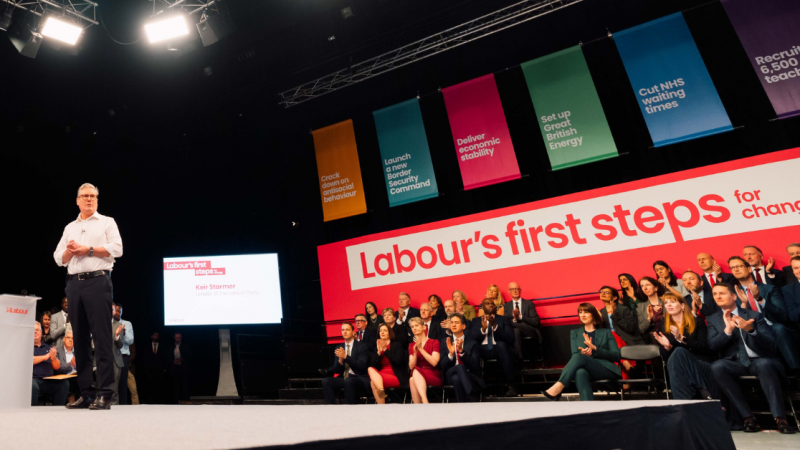
A majority of voters agree that each of Labour’s “first steps” are a good idea, but believe Keir Starmer is unlikely to achieve all of them in one term, a new poll has revealed.
The Labour leader last week unveiled six pledge card-style “first steps” towards the party’s five missions, described by a party spokesperson as “a distillation of Labour’s core retail offer” at the general election.
Research by More in Common, released today, found that, while more than six in ten respondents backed each of the pledges set out, 53% believed Labour would not deliver on all six within the next parliament.
The survey of 2,308 adults found that 45% of voters believe Labour’s plan to cut NHS waiting lists is the most important of the party’s six pledges, with launching a Border Security Command and sticking to tough spending rules coming a distant second with 13% each.
Despite Starmer promising to only make commitments Labour knows it can achieve in office, more than a third of voters (35%) think the pledges are overly ambitious, while 36% thought they are about right.
More than one in ten voters (15%) thought that the pledges are not ambitious enough, rising to 17% among Labour voters and 22% among Green Party voters.
The poll found that 53% of people, including 22% of Labour voters, thought that it was unlikely Labour would be able to deliver all the pledges made within a five-year government.
The public were also more likely to say that Labour do not have a plan for how to fund their spending commitments, with 39% believing the party does not have a plan, compared to 32% saying they do.
However, the poll also showed negative signs for the Conservatives, with voters even more likely to say they do not believe the Tories have a plan to fund proposed tax cuts.
Some 46% of voters said they thought the Conservatives have no plan to pay for tax cuts, with only 26% believing they do.
Research also found that Conservative attacks against Labour on tax are likely to have less potency with voters, with people viewing the risk of tax rises under a Starmer government as equal to that under Rishi Sunak.
Some 43% of respondents said they expected their tax bill to rise under Labour, compared to 40% who anticipated tax hikes if Sunak remained as Prime Minister.
The Conservatives have looked to use the threat of tax rises under a potential Labour government as an attack line to narrow the party’s vast polling gap.
Although the tactic was used in John Major’s surprise victory in 1992, executive director for More in Common Luke Tryl told Bloomberg: “Neither party has an advantage on the ‘no tax rises’ test. People think both parties are equally likely to put up taxes – this is likely to be more dangerous for the Conservatives.”
Research also found that less than a quarter of Conservative voters (23%) think that the Tories would cut taxes if they win the next general election, with 47% believing taxes would stay the same and 17% believing they would rise.
If you have anything to share that we should be looking into or publishing about this or any other topic involving Labour, on record or strictly anonymously, contact us at [email protected].
Sign up to LabourList’s morning email for a briefing everything Labour, every weekday morning.
If you can help sustain our work too through a monthly donation, become one of our supporters here.
And if you or your organisation might be interested in partnering with us on sponsored events or content, email [email protected].




More from LabourList
‘The cost of living crisis is still Britain’s defining political challenge’
‘Nurses are finally getting the recognition they deserve’
Letters to the Editor – week ending 15th February 2026